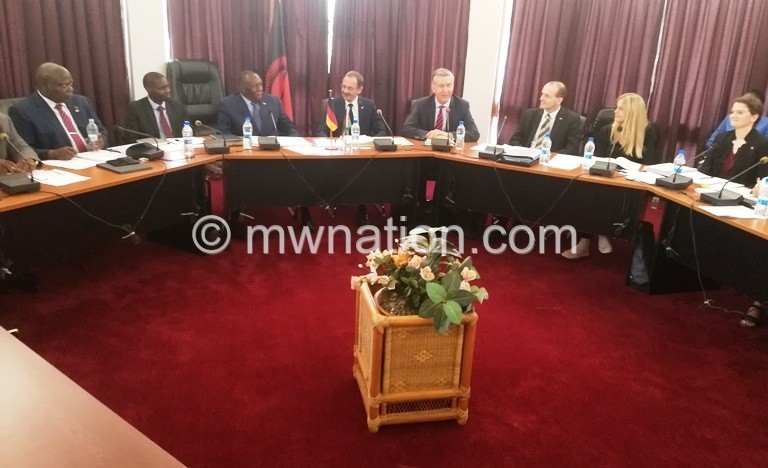Germany warns Malawi on political instability
Germany has asked Malawi Government to jointly work with the opposition and other stakeholders to ensure peace and tranquility for continued sustainable economic development and well-being of citizens.
Alois Schneider, German head of division for southern Africa in the Ministry of Economic Cooperation and Development (BMZ), made the appeal yesterday at Capital Hill in Lilongwe during the start of two-day bilateral negotiations on development cooperation between his country and Malawi.

He said Germany is aware that the bilateral discussions are taking place at a time of intense and difficult political debate in Malawi in the aftermath of the disputed presidential elections.
Schneider said he was confident that stakeholders will find the best way forward for Malawi to build a productive, competitive and resilient nation to enable all Malawians realise their potential, improve their living conditions and those of their families.
He said: “We sincerely hope and indeed expect the Malawi Government will do everything possible in the current political situation to honour this reputation of being a peaceful country and to uphold constitutional principles in handling the opposition protests.
“We strongly believe that there is need for dialogue among all stakeholders beyond the ongoing court case. We believe this is the time for joint dialogue to address the underlying root causes for the evident dissatisfaction in large parts of the population.
“Peace and stability as well as good governance and accountability are of major importance to achieve sustainable economic growth and enhanced employment opportunities for the benefit of all Malawians.”
Schneider said the prevailing high poverty rate remains a key issue for Malawi to address; hence, the need for enhanced efforts is aggravated by the high rate of population growth which threatens to melt away all advancements.
He said Germany stands ready to continue its support to Malawi in the quest to achieve sustainable development for the population of Malawi.
For more than 55 years, he said Germany has worked together with Malawi to improve health and social protection, access to and quality education and to create more jobs and income through private sector development in rural areas.
In the areas of cooperation, he expressed satisfaction with progress made in the recruitment of teachers and health workers to improve service delivery in health and education, the strengthened legal framework on control of goods, public audit and procurement and start of implementation of the new Integrated Financial Management Information System (Ifmis).
On his part, Secretary to the Treasury Cliff Chiunda hailed the German government’s support spanning for the past 55 years saying it has helped to drive the socioeconomic growth of the country.
He described the bilateral negotiations as a means of continuing the dialogue on Malawian and German governments’ development cooperation which is a commitment to engage in an open and transparent manner on strategic issues.
Said Chiunda: “We appreciate that the aim of the development cooperation in Malawi is to assist in poverty reduction as well as inclusive and sustainable growth.”
The outcome of the negotiations are set to be released today through a joint Malawi-German government statement.
Malawi is currently engulfed in political tension following the May 21 Tripartite Elections. Malawi Congress Party presidential candidate Lazarus Chakwera and UTM Party presidential hopeful Saulos Chilima are seeking nullification of the presidential elections in the Constitutional Court on the basis that the process was marred by irregularities.
On the other hand, Human Rights Defenders Coalition (HRDC) has been holding a series of demonstrations that have turned ugly demanding the head of Malawi Electoral Commission chairperson Jane Ansah for allegedly presiding over a flawed electoral process.





